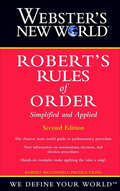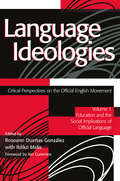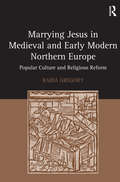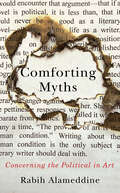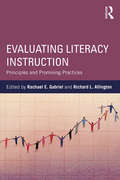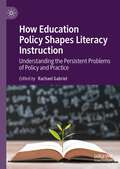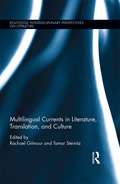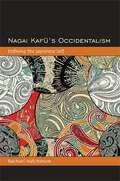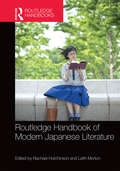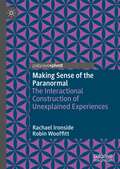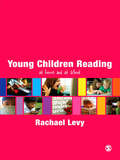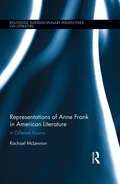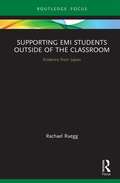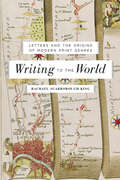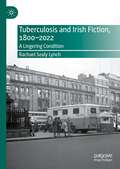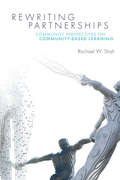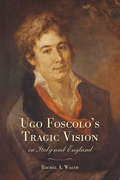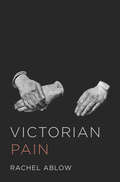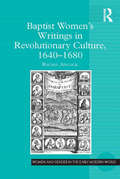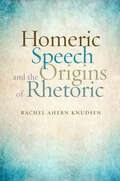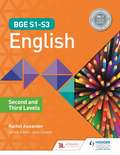- Table View
- List View
Webster's New World Robert's Rules of Order Simplified And Applied: Simplified And Applied
by RM ProductionsThis is the clearest, most useful guide to parliamentary procedure, now with new information on effective and reliable procedures for nominations, elections, ballots, balloting, and ballot counting.
Language Ideologies: Critical Perspectives on the Official English Movement, Volume I: Education and the Social Implications of Official Language
by ROSEANN DUEÑAS GONZÁLEZ; ILDIKÓ MELISHow do educators balance the rights of the rapidly growing percentage of the United States' population whose first language is not English or whose English differs from standard usage with the rights of the majority of students whose first and generally only language is English? This two-volume set addresses the complicated and divisive issues at the heart of the debate over language diversity and the English Only movement in the U.S. public education. Blending social, political, and legal analyses of the ideologies of language with perspectives on the impact of the English Only movement on education and on classrooms at all levels, Language Ideologies: Critical Perspectives on the Official English Movement offers a wide range of perspectives that teachers and literacy advocates can use to inform practice as well as policy. This exhaustive, two-volume collection not only updates existing information on the English Only movement in the United States, but also includes the international context, looking at the emergence of English as a world language through a postcolonial lens. The complexity of the debate is also reflected in the exceptionally diverse list of contributors, who speak from varying disciplines and backgrounds including sociology, linguistics, university administration, the ACLU, law, ESL, and English. Both volumes explore the political, legislative, and social implications of language ideologies. Volume 1: Education and the Social Implications of Official Language focuses in particular on the consequences for the classroom. In Volume 2: History, Theory, and Policy, the focus is on the implications for policymakers and language-program administrators.
Coffee Stories: Coffee સ્ટોરીઝ: એક સિપ હૂંફાળા સંબંધોને નામ!
by Raam Moriઆપણી સંસ્કૃતિ કથા અને કથનશૈલીની સંસ્કૃતિ રહી છે. કથાઓ આપણી આસપાસ દરેક ક્ષણે જીવાતી જ હોય છે. ધબકતી હૂંફાળી કથાઓ, સમાજના ડરથી સંકોડાયેલી તર નીચે ઠરી ગયેલી કથાઓ, પહેલાં જ ઘૂંટડે કડવી ઝેર લાગતી કથાઓ તો એક એક સિપ સાથે વધુને વધુ ગળચટ્ટી બનતી કથાઓ. નજરની સામે દરરોજ ભજવાતી એવી કથાઓ જે હજુ સુધી આપણા ધ્યાનમાં જ નથી આવી અથવા એવી કથાઓ જે સતત ધ્યાનમાં તો આવી છે પણ આપણે સતત આંખો મીંચી રાખી છે. કથાઓ એવી જેમાં આપણું પોતાનું મૌન ઘૂંટાયેલું રહ્યું છે ને એ મૌનની પરિભાષાને પણ લોકો ઉકેલી જાણે છે તો એવી પણ કથાઓ જેમાં ચિલ્લાઈ ચિલ્લાઈને પીડાને પોકારવામાં આવી હોય એમ છતાં એને સાંભળનાર કોઈ નથી હોતું. દઝાડતી, ફરિયાદ કરી લાલ આંખ કરીને આપણી સામે એકધારું જોઈ રહી છે એવી કથાઓ ખરેખર કોફીના કપ સાથે પુરી થઇ જાય અને કોફીની જેમ મગજ સતેજ કરી દે એવી વાર્તાઓનો સમુહ!
Marrying Jesus in Medieval and Early Modern Northern Europe: Popular Culture and Religious Reform
by Rabia GregoryThe first full-length study of the notion of marriage to Jesus in late medieval and early modern popular culture, this book treats the transmission and transformation of ideas about this concept as a case study in the formation of religious belief and popular culture. Marrying Jesus in Medieval and Early Modern Northern Europe provides a history of the dispersion of theology about the bride of Christ in the period between the twelfth and seventeenth centuries and explains how this metaphor, initially devised for a religious elite, became integral to the laity's pursuit of salvation. Unlike recent publications on the bride of Christ, which explore the gendering of sanctity or the poetics of religious eroticism, this is a study of popular religion told through devotional media and other technologies of salvation. Marrying Jesus argues against the heteronormative interpretation that brides of Christ should be female by reconstructing the cultural production of brides of Christ in late medieval Europe. A central assertion of this book is that by the fourteenth century, worldly, sexually active brides of Christ, both male and female, were no longer aberrations. Analyzing understudied vernacular sources from the late medieval period - including sermons, early printed books, spiritual diaries, letters, songs, and hagiographies - Rabia Gregory shows how marrying Jesus was central to late medieval lay piety, and how the 'chaste' bride of Christ developed out of sixteenth-century religious disputes.
Marrying Jesus in Medieval and Early Modern Northern Europe: Popular Culture and Religious Reform
by Rabia GregoryThe first full-length study of the notion of marriage to Jesus in late medieval and early modern popular culture, this book treats the transmission and transformation of ideas about this concept as a case study in the formation of religious belief and popular culture. Marrying Jesus in Medieval and Early Modern Northern Europe provides a history of the dispersion of theology about the bride of Christ in the period between the twelfth and seventeenth centuries and explains how this metaphor, initially devised for a religious elite, became integral to the laity's pursuit of salvation. Unlike recent publications on the bride of Christ, which explore the gendering of sanctity or the poetics of religious eroticism, this is a study of popular religion told through devotional media and other technologies of salvation. Marrying Jesus argues against the heteronormative interpretation that brides of Christ should be female by reconstructing the cultural production of brides of Christ in late medieval Europe. A central assertion of this book is that by the fourteenth century, worldly, sexually active brides of Christ, both male and female, were no longer aberrations. Analyzing understudied vernacular sources from the late medieval period - including sermons, early printed books, spiritual diaries, letters, songs, and hagiographies - Rabia Gregory shows how marrying Jesus was central to late medieval lay piety, and how the 'chaste' bride of Christ developed out of sixteenth-century religious disputes.
Comforting Myths: Concerning the Political in Art (Kapnick Foundation Distinguished Writer-in-Residence Lectures)
by Rabih AlameddineA timely and urgent inquiry by one of global literature's leading lights In this concisely argued and illuminating book, the PEN/Faulkner Award–winning author Rabih Alameddine takes the subject of politics and art head-on, questioning the very premise of dividing these two pillars of culture into an either/or proposition. He reveals how a political dimension enlarges a work of art rather than making it less beautiful or reducing it to a polemic, as we are so often and carelessly taught. But he also ponders what makes art political to begin with: how essential is the artist&’s conscious political intent, and what does the reader or viewer contribute to the work&’s political capability or significance? In exploring these questions, Alameddine engages intensely with his role as an immigrant and a gay author writing inside a globally dominant, often oblivious culture, and invokes the work of numerous writers, from Tayeb Salih and Aleksandar Hemon to Teju Cole and Salman Rushdie, who also struggle to be heard as something more than an &“other.&” The book features throughout Alameddine&’s brilliantly relatable voice—shrewd, humorous, challenging, and as honest about his own limitations as he is about his passions.
Evaluating Literacy Instruction: Principles and Promising Practices
by Richard L. Allington Rachael E. GabrielThis must-read book for all literacy educators illuminates the intersection of research on literacy instruction and teacher evaluation. Since 2009, 46 states have changed or revised policies related to evaluating teachers and school leaders. In order for these new policies to be used to support and develop effective literacy instruction, resources are needed that connect the best of what is known about teaching literacy with current evaluation policies and support practices. A major contribution to meeting this need, the volume brings together a range of perspectives on tools, systems, and policies for the evaluation of teaching, organized into two sections: • Crafting Systems and Policies for Evaluating Literacy Instruction • Examples of Alternative Systems/Approaches for Evaluating Literacy Instruction Across the text, expert scholars in the field emphasize the need for literacy professionals to do more than merely apply generic observation instruments for teacher evaluation, but also to consider how these tools reflect professional values, how elements of effective literacy instruction can be unearthed or included within them, and how teacher evaluation systems and policies can be used to increase students’ opportunities to develop literacy.
How Education Policy Shapes Literacy Instruction: Understanding the Persistent Problems of Policy and Practice
by Rachael GabrielReading instruction is the most legislated area of education and the most frequently referenced metric for measuring educational progress. This book traces the trajectories of policy issues with direct implications for literacy teaching, learning, and research in order to illustrate the dynamic relationships between policy, research, and practice as they relate to perennial issues such as: retention in grade, remediation, intervention, instruction for English learners, early literacy instruction, coaching, and leadership. Using policy documents and peer-reviewed articles published from the 1960s to the present, the editor and authors illustrate how issues were framed, what was at stake, and how policy solutions to persistent questions have been understood over time. In doing so, the book link a generation of scholars with research that illustrates trajectories of development for ideas, strategies, and solutions.
Multilingual Currents in Literature, Translation and Culture (Routledge Interdisciplinary Perspectives on Literature)
by Rachael Gilmour Tamar SteinitzAt a time increasingly dominated by globalization, migration, and the clash between supranational and ultranational ideologies, the relationship between language and borders has become more complicated and, in many ways, more consequential than ever. This book shows how concepts of ‘language’ and ‘multilingualism’ look different when viewed from Belize, Lagos, or London, and asks how ideas about literature and literary form must be remade in a contemporary cultural marketplace that is both linguistically diverse and interconnected, even as it remains profoundly unequal. Bringing together scholars from the fields of literary studies, applied linguistics, publishing, and translation studies, the volume investigates how multilingual realities shape not only the practice of writing but also modes of literary and cultural production. Chapters explore examples of literary multilingualism and their relationship to the institutions of publishing, translation, and canon-formation. They consider how literature can be read in relation to other multilingual and translational forms of contemporary cultural circulation and what new interpretative strategies such developments demand. In tracing the multilingual currents running across a globalized world, this book will appeal to the growing international readership at the intersections of comparative literature, world literature, postcolonial studies, literary theory and criticism, and translation studies.
Nagai Kafū's Occidentalism: Defining the Japanese Self
by Rachael HutchinsonNagai Kafū (1879–1959) spent more time abroad than any other writer of his generation, firing the Japanese imagination with his visions of America and France. Applying the theoretical framework of Occidentalism to Japanese literature, Rachael Hutchinson explores Kafū's construction of the Western Other, an integral part of his critique of Meiji civilization. Through contrast with the Western Other, Kafū was able to solve the dilemma that so plagued Japanese intellectuals—how to modernize and yet retain an authentic Japanese identity in the modern world. Kafū's flexible positioning of imagined spaces like the "West" and the "Orient" ultimately led him to a definition of the Japanese Self. Hutchinson analyzes the wide range of Kafū's work, particularly those novels and stories reflecting Kafū's time in the West and the return to Japan, most unknown to Western readers and a number unavailable in English, along with his better-known depictions of Edo's demimonde. Kafū's place in Japan's intellectual history and his influence on other writers are also discussed.
Routledge Handbook of Modern Japanese Literature
by Rachael Hutchinson and Leith MortonThe Routledge Handbook of Modern Japanese Literature provides a comprehensive overview of how we study Japanese literature today. Rather than taking a purely chronological approach to the content, the chapters survey the state of the field through a number of pressing issues and themes, examining the ways in which it is possible to read modern Japanese literature and situate it in relation to critical theory. The Handbook examines various modes of literary production (such as fiction, poetry, and critical essays) as distinct forms of expression that nonetheless are closely interrelated. Attention is drawn to the idea of the bunjin as a ‘person of letters’ and a more realistic assessment is provided of how writers have engaged with ideas – not labelled a ‘novelist’ or ‘poet’, but a ‘writer’ who may at one time or another choose to write in various forms. The book provides an overview of major authors and genres by situating them within broader themes that have defined the way writers have produced literature in modern Japan, as well as how those works have been read and understood by different readers in different time periods. The Routledge Handbook of Modern Japanese Literature draws from an international array of established experts in the field as well as promising young researchers. It represents a wide variety of critical approaches, giving the study a broad range of perspectives. This handbook will be of interest to students and scholars of Asian Studies, Literature, Sociology, Critical Theory, and History.
Making Sense of the Paranormal: The Interactional Construction of Unexplained Experiences
by Robin Wooffitt Rachael IronsideThis book is a study of how people collaboratively interpret events or experiences as having paranormal features, or as evidence of spiritual agency. The authors study recordings of paranormal research groups as they conduct real life investigations into allegedly haunted spaces and the analyses describe how, through their talk and embodied actions, participants collaboratively negotiate the paranormal status of the events they experience.By drawing on the study of the social organisation in everyday interaction, they show how paranormal interpretations may be proposed, contested and negotiated through conversational and embodied practices of the group. The book contributes to the sociology of anomalous experience, and explores its relevance to other social science topics such as dark tourism, participation in religious spaces and practices, and the attribution of agency. This book will therefore be of interest to academics and postgraduate researchers of language and social interaction; discourse and communication, cultural studies; social psychology, sociology of religious experience; parapsychology, communication and psychotherapy.
Young Children Reading: At home and at school
by Rachael LevyDeveloping and supporting literacy is an absolute priority for all early years settings and primary schools, and something of a national concern. By presenting extensive research evidence, Rachael Levy shows how some of our tried and tested approaches to teaching reading may be counter-productive, and are causing some young children to lose confidence in their abilities as readers. Through challenging accepted definitions and perspectives on reading, this book encourages the reader to reflect critically on the current reading curriculum, and to consider ways in which their own practice can be developed to match the changing literacy landscape of the 21st century. Placing the emphasis on the voices of the children themselves, the author looks at: - what it feels like to be a reader in the digital age - children's perceptions of reading - home and school reading - reading in multidimensional forms - the future teaching of reading Essential reading for all trainee and practising teachers, this critical examination of a vital topic will support all those who are interested in the way we can help future generations to become literate. This book will encourage researchers and practitioners alike to redefine their own views of literacy, and situate 'reading literacy' within the digital world in which young children now live.
Representations of Anne Frank in American Literature: Stories in New Ways (Routledge Interdisciplinary Perspectives on Literature)
by Rachael McLennanThis book explores portrayals of Anne Frank in American literature, where she is often invoked, if problematically, as a means of encouraging readers to think widely about persecution, genocide, and victimisation; often in relation to gender, ethnicity, and race. It shows how literary representations of Anne Frank in America over the past 50 years reflect the continued dominance of the American dramatic adaptations of Frank’s Diary in the 1950s, and argues that authors feel compelled to engage with the problematic elements of these adaptations and their iconic power. At the same time, though, literary representations of Frank are associated with the adaptations; critics often assume that these texts unquestioningly perpetuate the problems with the adaptations. This is not true. This book examines how American authors represent Frank in order to negotiate difficult questions relating to representation of the Holocaust in America, and in order to consider gender, coming of age, and forms of inequality in American culture in various historical moments; and of course, to consider the ways Frank herself is represented in America. This book argues that the most compelling representations of Frank in American literature are alert to their own limitations, and may caution against making Frank a universal symbol of goodness or setting up too easy identifications with her. It will be of great interest to researchers and students of Frank, the Holocaust in American fiction and culture, gender studies, life writing, young adult fiction, and ethics.
Supporting EMI Students Outside of the Classroom: Evidence from Japan (Routledge Focus on English-Medium Instruction in Higher Education)
by Rachael RueggThere is a growing body of research on English-medium Instruction (EMI) in Asian contexts, and much of this research points out difficulties experienced by stakeholders. This volume takes up the issue of support for EMI, which is, and which can be, offered to students outside of the classroom in order to help them succeed academically in an EMI environment. Dr Ruegg’s book demonstrates the effectiveness of such support in the Japanese context. It begins by examining the support currently available for students in English-medium full degree programmes then goes on to examine one successful support service in more detail in order to determine the kinds of effects that can be achieved by establishing such a centre. The research reported in this book was conducted in Japan, but the findings will apply in other locations, especially in other Asian countries. The information provided in the book is expected to inform institutions who are looking to either establish an English-medium degree programme or improve on an existing programme by sharing information about the practices of other institutions.
Writing to the World: Letters and the Origins of Modern Print Genres
by Rachael Scarborough KingLetters played a foundational role in facilitating the rise of print and popularizing new modes of writing in the long eighteenth century.In Writing to the World, Rachael Scarborough King examines the shift from manuscript to print media culture in the long eighteenth century. She introduces the concept of the "bridge genre," which enables such change by transferring existing textual conventions to emerging modes of composition and circulation. She draws on this concept to reveal how four crucial genres that emerged during this time—the newspaper, the periodical, the novel, and the biography—were united by their reliance on letters to accustom readers to these new forms of print media.King explains that as newspapers, scientific journals, book reviews, and other new genres began to circulate widely, much of their form and content was borrowed from letters, allowing for easier access to these unfamiliar modes of printing and reading texts. Arguing that bridge genres encouraged people to see themselves as connected by networks of communication—as members of what they called "the world" of writing—King combines techniques of genre theory with archival research and literary interpretation, analyzing canonical works such as Addison and Steele’s Spectator, Samuel Johnson’s Lives of the Poets, and Jane Austen’s Northanger Abbey alongside anonymous periodicals and the letters of middle-class housewives. This original and groundbreaking work in media and literary history offers a model for the process of genre formation. Ultimately, Writing to the World is a sophisticated look at the intersection of print and the public sphere.
Writing to the World: Letters and the Origins of Modern Print Genres
by Rachael Scarborough King“King’s pitch for the indebtedness of the genres we know well—the novel, the biography, the magazine piece—to letter writing is stylish and convincing.” —Christina Lupton, author of Reading and the Making of Time in the Eighteenth CenturyIn Writing to the World, Rachael Scarborough King examines the shift from manuscript to print media culture in the long eighteenth century. She introduces the concept of the “bridge genre,” which enables such change by transferring existing textual conventions to emerging modes of composition and circulation. She draws on this concept to reveal how four crucial genres that emerged during this time—the newspaper, the periodical, the novel, and the biography—were united by their reliance on letters to accustom readers to these new forms of print media.King explains that as newspapers, scientific journals, book reviews, and other new genres began to circulate widely, much of their form and content was borrowed from letters, allowing for easier access to these unfamiliar modes of printing and reading texts. Arguing that bridge genres encouraged people to see themselves as connected by networks of communication—as members of what they called “the world” of writing—King combines techniques of genre theory with archival research and literary interpretation, analyzing canonical works such as Addison and Steele’s Spectator, Samuel Johnson’s Lives of the Poets, and Jane Austen’s Northanger Abbey alongside anonymous periodicals and the letters of middle-class housewives.This original and groundbreaking work in media and literary history offers a model for the process of genre formation. Ultimately, Writing to the World is a sophisticated look at the intersection of print and the public sphere.“This erudite, sophisticated, beautifully written book is a major achievement.” —Thomas Keymer, author of Poetics of the Pillory
Tuberculosis and Irish Fiction, 1800–2022: A Lingering Condition (New Directions in Irish and Irish American Literature)
by Rachael Sealy LynchThis book focuses on Ireland’s lived experience of tuberculosis as represented in the nation’s fiction; not surprisingly, the disease both manifests and conceals itself with devastating frequency in literature as it did in life. It seeks to place the history of tuberculosis in Ireland, from 1800 until after its virtual eradication in the mid-Twentieth Century, in conversation with fictional representations or repressions of a condition so fearsome that until very recently it was usually referred to by code words and euphemisms rather than by its name.
Rewriting Partnerships: Community Perspectives on Community-Based Learning
by Rachael W. ShahCommunity members are rarely tapped for their insights on engaged teaching and research, but without these perspectives, it is difficult to create ethical and effective practices. Rewriting Partnerships calls for a radical reorientation to the knowledges of community partners. Emphasizing the voices of community members themselves—the adult literacy learners, secondary students, and youth activists who work with college students—the book introduces Critical Community-Based Epistemologies, a deeply practical approach to knowledge construction that centers the perspectives of marginalized participants. Drawing on interviews with over eighty community members, Rewriting Partnerships features community knowledges in three common types of community-engaged learning: youth working with college students in a writing exchange program, nonprofit staff who serve as clients for student projects, and community members who work with graduate students. Interviewees from each type of partnership offer practical strategies for creating more ethical collaborations, including how programs are built, how projects are introduced to partners, and how graduate students are educated. The book also explores three approaches to partnership design that create space for community voices at the structural level: advisory boards, participatory evaluation, and community grading. Immediately applicable to teachers, researchers, community partners, and administrators involved in community engagement, Rewriting Partnerships offers concrete strategies for creating more community-responsive partnerships at the classroom level as well as at the level of program and research design. But most provocatively, the book challenges common assumptions about who can create knowledge about community-based learning, demonstrating that community partners have the potential to contribute significantly to community engagement scholarship and program decision-making.
Ugo Foscolo's Tragic Vision in Italy and England
by Rachel A. WalshOne of the most celebrated Italian writers of the early Romantic period, Ugo Foscolo (1778-1827) was known primarily as a novelist, a poet, and a nationalist. Following the Napoleonic Wars, he lived in self-exile in England during the last decade of his life. There he wrote numerous critical essays and collaborated with Lord Byron and other well-known members of English literary circles.Ugo Foscolo's Tragic Vision in Italy and England examines an underexplored aspect of Foscolo's literary career: his tragic plays and critical essays on that genre. Rachel A. Walsh argues that for Foscolo tragedy was more than another genre in which to exercise his literary ambitions. It was the medium for an elaborate life-long process of self-examination and engagement with political and literary conflict. By analysing Foscolo's tragic struggles on and off the stage, Walsh sheds new light on his career and how it reflects on the important literary and political trends of the time.
Victorian Pain
by Rachel AblowThe nineteenth century introduced developments in science and medicine that made the eradication of pain conceivable for the first time. This new understanding of pain brought with it a complex set of moral and philosophical dilemmas. If pain serves no obvious purpose, how do we reconcile its existence with a well-ordered universe? Examining how writers of the day engaged with such questions, Victorian Pain offers a compelling new literary and philosophical history of modern pain.Rachel Ablow provides close readings of novelists Charlotte Brontë and Thomas Hardy and political and natural philosophers John Stuart Mill, Harriet Martineau, and Charles Darwin, as well as a variety of medical, scientific, and popular writers of the Victorian age. She explores how discussions of pain served as investigations into the status of persons and the nature and parameters of social life. No longer conceivable as divine trial or punishment, pain in the nineteenth century came to seem instead like a historical accident suggesting little or nothing about the individual who suffers.A landmark study of Victorian literature and the history of pain, Victorian Pain shows how these writers came to see pain as a social as well as a personal problem. Rather than simply self-evident to the sufferer and unknowable to anyone else, pain was also understood to be produced between persons—and even, perhaps, by the fictions they read.
Baptist Women’s Writings in Revolutionary Culture, 1640-1680 (Women and Gender in the Early Modern World)
by Rachel AdcockAlthough literary-historical studies have often focused on the range of dissenting religious groups and writers that flourished during the English Revolution, they have rarely had much to say about seventeenth-century Baptists, or, indeed, Baptist women. Baptist Women’s Writings in Revolutionary Culture, 1640-1680 fills that gap, exploring how female Baptists played a crucial role in the group’s formation and growth during the 1640s and 50s, by their active participation in religious and political debate, and their desire to evangelise their followers. The study significantly challenges the idea that women, as members of these congregations, were unable to write with any kind of textual authority because they were often prevented from speaking aloud in church meetings. On the contrary, Adcock shows that Baptist women found their way into print to debate points of church organisation and doctrine, to defend themselves and their congregations, to evangelise others by example and by teaching, and to prophesy, and discusses the rhetorical tactics they utilised in order to demonstrate the value of women’s contributions. In the course of the study, Adcock considers and analyses the writings of little-studied Baptist women, Deborah Huish, Katherine Sutton, and Jane Turner, as well as separatist writers Sara Jones, Susanna Parr, and Anne Venn. She also makes due connection to the more familiar work of Agnes Beaumont, Anna Trapnel, and Anne Wentworth, enabling a reassessment of the significance of those writings by placing them in this wider context. Writings by these female Baptists attracted serious attention, and, as Adcock discusses, some even found a trans-national audience.
Homeric Speech and the Origins of Rhetoric
by Rachel Ahern KnudsenKnudsen argues that Homeric epics are the locus for the origins of rhetoric.Traditionally, Homer's epics have been the domain of scholars and students interested in ancient Greek poetry, and Aristotle's rhetorical theory has been the domain of those interested in ancient rhetoric. Rachel Ahern Knudsen believes that this academic distinction between poetry and rhetoric should be challenged. Based on a close analysis of persuasive speeches in the Iliad, Knudsen argues that Homeric poetry displays a systematic and technical concept of rhetoric and that many Iliadic speakers in fact employ the rhetorical techniques put forward by Aristotle.Rhetoric, in its earliest formulation in ancient Greece, was conceived as the power to change a listener’s actions or attitudes through words—particularly through persuasive techniques and argumentation. Rhetoric was thus a "technical" discipline in the ancient Greek world, a craft (technê) that was rule-governed, learned, and taught. This technical understanding of rhetoric can be traced back to the works of Plato and Aristotle, which provide the earliest formal explanations of rhetoric. But do such explanations constitute the true origins of rhetoric as an identifiable, systematic practice? If not, where does a technique-driven rhetoric first appear in literary and social history? Perhaps the answer is in Homeric epics. Homeric Speech and the Origins of Rhetoric demonstrates a remarkable congruence between the rhetorical techniques used by Iliadic speakers and those collected in Aristotle's seminal treatise on rhetoric. Knudsen's claim has implications for the fields of both Homeric poetry and the history of rhetoric. In the former field, it refines and extends previous scholarship on direct speech in Homer by identifying a new dimension within Homeric speech—namely, the consistent deployment of well-defined rhetorical arguments and techniques. In the latter field, it challenges the traditional account of the development of rhetoric, probing the boundaries that currently demarcate its origins, history, and relationship to poetry.
BGE S1–S3 English: Second and Third Levels
by Rachel AlexanderSyllabus: CfE (Curriculum for Excellence, from Education Scotland) and SQALevel: BGE S1-3: Second & Third LevelSubject: EnglishBuild, strengthen and extend pupils' skills with this creative and collaborative approach to English. As they progress through a rich selection of text extracts, active learning tasks and end-of-chapter assessments, pupils will enjoy developing their Talk and Listening, Writing, Critical Reading and RUAE skills throughout S1-S3.Covering all CfE Second and Third Level Benchmarks for Literacy and English, this ready-made and fully differentiated BGE course puts progression for every pupil at the heart of your curriculum.- Boost confidence and competence in literacy and language: Active learning tasks are clearly marked as 'building', 'strengthening' and 'extending' so students can see how their skills are improving- Meet the needs of each pupil in your class: Carefully chosen text extracts and scaffolded activities support pupils working towards Level 2 and help you close the attainment gap- Effectively check and assess progress: Formative assessments at the end of each chapter help you monitor progression against the Experiences & Outcomes and Benchmarks (with additional assessments in the separate Planning & Assessment Pack)- Lay firm foundations for National qualifications: Covering all skills across Talk and Listening, Writing, Critical Reading, and Reading for Understanding, Analysis and Evaluation will set pupils up for success at National 5 and beyond
BGE S1–S3 English: Second and Third Levels
by Rachel AlexanderSyllabus: CfE (Curriculum for Excellence, from Education Scotland) and SQALevel: BGE S1-3: Second & Third LevelSubject: EnglishBuild, strengthen and extend pupils' skills with this creative and collaborative approach to English. As they progress through a rich selection of text extracts, active learning tasks and end-of-chapter assessments, pupils will enjoy developing their Talk and Listening, Writing, Critical Reading and RUAE skills throughout S1-S3.Covering all CfE Second and Third Level Benchmarks for Literacy and English, this ready-made and fully differentiated BGE course puts progression for every pupil at the heart of your curriculum.- Boost confidence and competence in literacy and language: Active learning tasks are clearly marked as 'building', 'strengthening' and 'extending' so students can see how their skills are improving- Meet the needs of each pupil in your class: Carefully chosen text extracts and scaffolded activities support pupils working towards Level 2 and help you close the attainment gap- Effectively check and assess progress: Formative assessments at the end of each chapter help you monitor progression against the Experiences & Outcomes and Benchmarks (with additional assessments in the separate Planning & Assessment Pack)- Lay firm foundations for National qualifications: Covering all skills across Talk and Listening, Writing, Critical Reading, and Reading for Understanding, Analysis and Evaluation will set pupils up for success at National 5 and beyond
